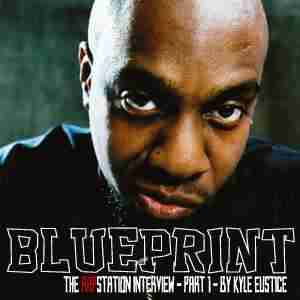
Blueprint: The RAPstation Interview - Part 1
By Rapstation Editor for Rapstation.com
Born in Columbus, Ohio, Albert Shepard adopted his stage name, Blueprint, in 1996. "I wanted a name that implied that was I was doing musically was paying tribute to the original rules and attributes of the art form, so to speak," he explains. "My style was created from hip-hop's blueprint. It was all good before Google search and until Jay Z named his album The Blueprint [laughs]. It's not a good name for Google search, but I still roll with it!"
As one of half of Soul Position, along with producer RJD2, and the rap group Greenhouse with fellow emcee Illogic, Blueprint's career has been on the upswing since the early Scribble Jam days. He appeared on RJD2's 2002 seminal album, Deadringer and around the same time released his solo debut, The Weightroom. In 2004, he released Chamber Music and since then has steadily released album after album, culminating with 2015's King No Crown. Although albums like 2005's 1988, 2011's Adventures in Counter-Culture and 2014's Respect the Architect were released via Rhymesayers Entertainment, he's more focused on his own imprint, Weightless Recordings, which he established in 1999.
In the first installment of the interview, Blueprint talks about meeting RJD2, Rhymesayers and heading out on his own. In the exciting conclusion, we'll discuss year five of his sobriety and more. Check out www.rapstation.com later in the week for Part 2. Visit www.printmatic.net for everything Blueprint.
You are about to take off on the "King No Crown Tour." Are you excited to get back on the road?
For sure. I typically tour once a year now for the last three or four years. I changed my schedule. I do about a two-month tour and then I'm home for the other nine or 10 months. That's just worked out much better for me. I can leave the house once and when I'm back, I'm back. But around eight or nine months, you start to miss it.
You have the timing down now. It's kind of ironic, I interviewed RJD2 the other day, who you have worked with a lot. You first popped up on his 2002 album, Deadringer. How did you meet?
RJ and I met just through the scene in Columbus. He had just moved back from the Bay Area, I believe. I was living in Cincinnati at the time, but my family and crew was from Columbus so I was up there every other weekend visiting people and going to hip-hop events. This was even before RJ knew that I rhymed. I met him through a friend of mine, DJ True Skills. He found out I was doing some weird instrumental music so he thought I should meet RJ. We played some things for each other and that's when we became cool. What he played for me ended up being the demos for Deadringer and what I played for him ended up being a lot of stuff from my Chamber Music instrumental album. We became friends. Then when he saw me rap, he was like, 'Wait a minute. We have to do some work together.' "Final Frontier" is the first song we recorded together.
Do you feel like that opened you up to a new audience at all?
I did have a few things going on at the time. We a lot of different projects going on. I was obviously from Cincinnati and a part of that whole movement there like with Scribble Jam. That whole battle scene was something I was involved in. I was still running around with the early incarnation of what would become Rhymesayers. Our releases, the Weightless ones, were starting to do well as far as national coverage. Deadringer didn't immediately hit though. It wasn't like it came out and blew up. It seemed like it took that record nine months or a year before it really got big. We were doing Soul Position at the same time. I had all of these little things going on at the exact same time and some of them just started thinking, you know?
Speaking of Rhmesayers, last time I saw you, you were signed with RSE and on tour with Atmosphere. Are you still affiliated with the label or are you totally on your own?
I never technically had a "contract" with Rhymesayers. That's kind of what is different about my situation. I was one of the guys in the beginning who was on the label. My relationships with them are like friends or brothers. I've never had a situation where I was bound by anything. I come and go as I please. They've given me that freedom. Right now is a period where I wanted to get a lot of these projects out and experience doing some things on my own. They allow me to do that and encourage it. They still support me in everything I do.
How does it feel to be on your own now?
There are trade offs. For me, right now, I think it's best for me to have the freedom to release as much music as I can. The bigger machine, the more hoops you have to jump through to get out a record. Rhymesayers is now distributed by Warner Bros. That's a big situation that puts a lot of pressure on records. Whereas if I put out a record on my own, I'm not held to Warner Brothers' expectations.
Whew! Sounds like a lot of pressure and I'm not even in the situation.
[Laughs] It changes a lot.